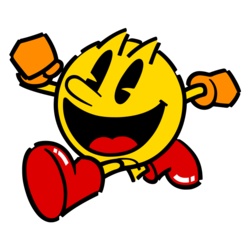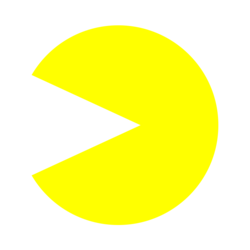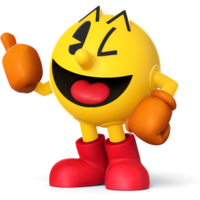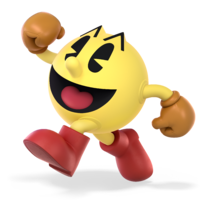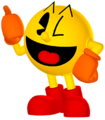Pac-Man: Difference between revisions
mNo edit summary |
No edit summary |
||
| (9 intermediate revisions by 7 users not shown) | |||
| Line 4: | Line 4: | ||
{{Infobox Character General | {{Infobox Character General | ||
|name = Pac-Man | |name = Pac-Man | ||
|image = {{tabber|title1=Anthropomorphic| | |image = {{tabber|title1=Anthropomorphic|content1=[[File:Pac-Man.png|250px]]|title2=Original|content2=[[File:pacmanvintage.png|x250px]]}} | ||
|caption = [[File:PacManSymbol.svg|50px|class=invert]] | |caption = [[File:PacManSymbol.svg|50px|class=invert-dark]] | ||
Official artwork of Pac-Man's two main forms. | Official artwork of Pac-Man's two main forms. | ||
|universe = {{uv|Pac-Man}} | |universe = {{uv|Pac-Man}} | ||
|firstgame = ''{{b|Pac-Man|game}}'' (1980) | |firstgame = ''{{b|Pac-Man|game}}'' (1980) | ||
|lastappearance= '' | |lastappearance= ''Pac-Man SuperFast!'' (2024) | ||
|games = ''[[SSB4]]''<br>''[[Ultimate]]'' | |games = ''[[SSB4]]''<br>''[[Ultimate]]'' | ||
|console = Arcade | |console = Arcade | ||
| Line 29: | Line 29: | ||
As a character, Pac-Man initially began with very few personality traits, reflecting his simplistic appearance in the games. Later installments in the franchise, such as the ''Pac-Man World'' series, expand on the character and his backstory. In these games, he is a father with a large family that he deeply cares about, and he is characterized as a relatively laid-back hero who is willing to help wherever he is needed. Both of these traits were first established in Hanna-Barbera's ''Pac-Man'' cartoon series, which — unlike American multimedia adaptations of franchises such as {{uv|Mario}} and {{uv|Sonic}} — was greatly influential to the ''Pac-Man'' universe and set the groundwork for most media that followed, thanks in part to a large portion of ''Pac-Man'' titles having been developed outside of the character's home country in Japan. His relationship with the [[ghosts]] — Blinky, Pinky, Inky, and Clyde — has also changed over the years: they have been depicted as archenemies, allies of circumstance, or even friendly rivals. | As a character, Pac-Man initially began with very few personality traits, reflecting his simplistic appearance in the games. Later installments in the franchise, such as the ''Pac-Man World'' series, expand on the character and his backstory. In these games, he is a father with a large family that he deeply cares about, and he is characterized as a relatively laid-back hero who is willing to help wherever he is needed. Both of these traits were first established in Hanna-Barbera's ''Pac-Man'' cartoon series, which — unlike American multimedia adaptations of franchises such as {{uv|Mario}} and {{uv|Sonic}} — was greatly influential to the ''Pac-Man'' universe and set the groundwork for most media that followed, thanks in part to a large portion of ''Pac-Man'' titles having been developed outside of the character's home country in Japan. His relationship with the [[ghosts]] — Blinky, Pinky, Inky, and Clyde — has also changed over the years: they have been depicted as archenemies, allies of circumstance, or even friendly rivals. | ||
Due to his simplistic character, Pac-Man's personality can also vary between depictions — for instance, ''Pac-Man 2: The New Adventures'' portrays the character as an archetypal golden-age cartoon anti-hero who is overly emotional and often selfish, needing the player's intervention to succeed in his goals. ''Pac-Man World 3'' portrays Pac-Man as a flippant, sarcastic hero who is prone to cracking somewhat edgy jokes and does not take the conflicts he faces seriously. The ''Pac-Man & the Ghostly Adventures'' franchise reinterprets the character as a naïve high school student with a mysterious, tragic backstory. | Due to his simplistic character, Pac-Man's personality can also vary between depictions, usually adapting to the trends in children's entertainment at the time — for instance, ''Pac-Man 2: The New Adventures'' portrays the character as an archetypal golden-age cartoon anti-hero who is overly emotional and often selfish, needing the player's intervention to succeed in his goals. ''Pac-Man World 3'' portrays Pac-Man as a flippant, sarcastic hero who is prone to cracking somewhat edgy jokes and does not take the conflicts he faces seriously. The ''Pac-Man & the Ghostly Adventures'' franchise reinterprets the character as a naïve high school student with a mysterious, tragic backstory. The present-day incarnation of Pac-Man has been depicted as athletic, universally friendly towards even villains (to the point of ''Pac-Man World Re-Pac'' relegating the source material's infamously cruel comeuppance for Toc-Man to a bad ending, and adding a new, peaceful good ending), and supportive; with promotional materials featuring motivational advice. Regardless of personality and appearance, he is typically shown to have a ravenous appetite, owing to the original game's focus on eating dots and [[Bonus Fruit]]. | ||
==In ''[[Super Smash Bros. Brawl]]''== | ==In ''[[Super Smash Bros. Brawl]]''== | ||
| Line 106: | Line 106: | ||
*Pac-Man and [[Kazuya]] are the only characters to have a [[taunt]] with an official name, with Pac-Man's being [[Namco Roulette]]. Incidentally, they are both owned by [[Bandai Namco]]. | *Pac-Man and [[Kazuya]] are the only characters to have a [[taunt]] with an official name, with Pac-Man's being [[Namco Roulette]]. Incidentally, they are both owned by [[Bandai Namco]]. | ||
*Pac-Man is the first third-party character to debut in the arcades. | *Pac-Man is the first third-party character to debut in the arcades. | ||
*As the first appearance of a yellow, hungry character named Pac-Man was a Tomy bank toy in the 1970s, he is technically the only playable ''Smash'' character to not be created specifically with gaming in mind, and the second to debut in a medium outside of gaming or direct promotional materials for games after [[Lucario]], though whether the game was based on the toy or simply a coincidence is often disputed by ''Pac-Man'' historians. | |||
==References== | ==References== | ||
Latest revision as of 14:31, December 21, 2024
- For fighter info, see Pac-Man (SSB4) and Pac-Man (SSBU).
| Pac-Man | |
|---|---|

Official artwork of Pac-Man's two main forms. | |
| Universe | Pac-Man |
| Debut | Pac-Man (1980) |
| Smash Bros. appearances | SSB4 Ultimate |
| Most recent non-Smash appearance | Pac-Man SuperFast! (2024) |
| Console/platform of origin | Arcade |
| Species | Pac-Person |
| Gender | Male |
| Place of origin | Pac-Land |
| Created by | Tōru Iwatani |
| Designed by | Tōru Iwatani Tadashi Yamashita |
| Article on Wikipedia | Pac-Man (character) |
Pac-Man, also stylized as PAC-MAN (パックマン, Pacman, originally written Puckman), is the main character in the eponymous Pac-Man series. He is Bandai Namco's mascot and one of the most widely recognized video game characters in the world.[1]
Origin[edit]
Pac-Man debuted as the main playable character in the arcade game, Pac-Man, in 1980. His minimalist yet iconic design was inspired by multiple sources: a rounded simplification of the Japanese character 口 (kuchi), meaning "mouth"; a 1970s toyline by Tomy; and a pizza missing a single slice. His name is derived from the Japanese onomatopoeia ぱくぱく (paku paku), meaning to rapidly open and close one's mouth. Japanese promotional art for the arcade game depicted Pac-Man with a slightly more humanoid design, featuring limbs with orange gloves and red boots, as well as a long nose; this design would be refined over time and subsequently featured in the games beginning with the 1984 arcade title Pac-Land.
As a character, Pac-Man initially began with very few personality traits, reflecting his simplistic appearance in the games. Later installments in the franchise, such as the Pac-Man World series, expand on the character and his backstory. In these games, he is a father with a large family that he deeply cares about, and he is characterized as a relatively laid-back hero who is willing to help wherever he is needed. Both of these traits were first established in Hanna-Barbera's Pac-Man cartoon series, which — unlike American multimedia adaptations of franchises such as Mario and Sonic — was greatly influential to the Pac-Man universe and set the groundwork for most media that followed, thanks in part to a large portion of Pac-Man titles having been developed outside of the character's home country in Japan. His relationship with the ghosts — Blinky, Pinky, Inky, and Clyde — has also changed over the years: they have been depicted as archenemies, allies of circumstance, or even friendly rivals.
Due to his simplistic character, Pac-Man's personality can also vary between depictions, usually adapting to the trends in children's entertainment at the time — for instance, Pac-Man 2: The New Adventures portrays the character as an archetypal golden-age cartoon anti-hero who is overly emotional and often selfish, needing the player's intervention to succeed in his goals. Pac-Man World 3 portrays Pac-Man as a flippant, sarcastic hero who is prone to cracking somewhat edgy jokes and does not take the conflicts he faces seriously. The Pac-Man & the Ghostly Adventures franchise reinterprets the character as a naïve high school student with a mysterious, tragic backstory. The present-day incarnation of Pac-Man has been depicted as athletic, universally friendly towards even villains (to the point of Pac-Man World Re-Pac relegating the source material's infamously cruel comeuppance for Toc-Man to a bad ending, and adding a new, peaceful good ending), and supportive; with promotional materials featuring motivational advice. Regardless of personality and appearance, he is typically shown to have a ravenous appetite, owing to the original game's focus on eating dots and Bonus Fruit.
In Super Smash Bros. Brawl[edit]
While Pac-Man is completely absent from Brawl, he was reportedly requested by Shigeru Miyamoto to be another third-party character in Brawl. However, Sakurai rejected the idea as he felt that Pac-Man appearing in his famous 2D form seemed too far-fetched.[2]
In Super Smash Bros. 4[edit]
As a playable character[edit]
Pac-Man is a playable character in Super Smash Bros. 4, revealed behind closed doors at the E3 Smash Bros Q&A and made known to the general public via Nintendo of America's official Twitter account before being covered on 'Pic of the Day' the following morning.
Pac-Man ranks at 46th place on the Smash 4 tier list in the F tier. His Bonus Fruit special move acts as an effective projectile with differing attacks depending on its state upon being thrown. He also has a strong combo game at his disposal, able to perform combos both on the ground and in the air. However, his Bonus Fruit, Power Pellet, and Fire Hydrant specials can all be turned against him easily, creating some risks for himself in battle. He also suffers from an unreliable grab due to its high lag, and has trouble scoring KOs. Nevertheless, Pac-Man can excel by using his combo ability and the versatility in his specials. Currently, Pac-Man has a few dedicated players, but low tournament results.
Trophies[edit]
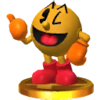
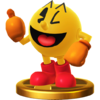
- PAC-MAN
The yellow, circular hero of the game PAC-MAN, which is recognized as the "Most Successful Coin-Operated Arcade Game" by Guinness World Records. In Smash Bros., he uses several moves inspired by the original PAC-MAN. Wakawaka your foes by charging up the Power Pellet move and aiming at them.
- Arcade: PAC-MAN (1980)
- Arcade: PAC-LAND (1984)
The yellow, circular hero of the game PAC-MAN, which is recognised as the "Most Successful Coin-Operated Arcade Game" by Guinness World Records. In this game, some of his attacks are based on the original PAC-MAN. Charge up his Power Pellet move, then aim it right at an opponent to wakawaka them extra hard.
- Arcade: PAC-MAN (1980 (JP))
- Arcade: PAC-LAND (1984 (JP))

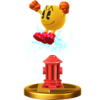
- PAC-MAN (Alt.)
PAC-MAN's Fire Hydrant down special pushes opponents away with blasts of water. You can drop the hydrant on top of your opponents to damage them, but they can also attack it to damage you if you're standing on it! His Pac-Jump up special spawns a trampoline he can jump on three times—the third jump is especially high!
- Arcade: PAC-MAN (1980)
- Arcade: PAC-LAND (1984)
PAC-MAN's Fire Hydrant down special pushes opponents away with blasts of water. You can drop the hydrant on top of your opponents to damage them, but they can also attack it and hit you with it to cause damage! His Pac-Jump up special spawns a trampoline he can jump on three times, and the third jump is especially high!
- Arcade: PAC-MAN (1980 (JP))
- Arcade: PAC-LAND (1984 (JP))
In Super Smash Bros. Ultimate[edit]
As a playable character[edit]
Pac-Man returns as a playable character alongside the series' entire playable cast in Super Smash Bros. Ultimate, this time as an unlockable character.
Spirit[edit]
Names in other languages[edit]
Trivia[edit]
- With his debut in May 1980, Pac-Man is one of the earliest-created characters introduced in the Super Smash Bros. series, alongside Mr. Game & Watch. He is the oldest third-party character, and the oldest character introduced in Smash 4.
- Pac-Man appeared as a playable character in Super Smash Bros. 4 34 years after his debut, therefore having the largest gap of any playable character in the Smash series between their first appearance and Smash debut.
- Super Smash Bros. 4 is not Pac-Man's first appearance in a crossover fighting game; he had previously appeared in Street Fighter x Tekken in a Mokujin mech, as an exclusive guest fighter on the PlayStation 3 and PlayStation Vita versions. This game also features Ryu and Ken from the Street Fighter side, Kazuya from the Tekken side, as well as a version of Mega Man based on the North American box art of the original Mega Man game for the NES.
- Pac-Man has had several prior crossovers with Nintendo franchises (mainly Mario) before Super Smash Bros. He previously appeared in all three Mario Kart Arcade GP titles as a playable racer. In addition, Mario appeared as the announcer in the Nintendo-developed installment of his series, Pac-Man Vs.
- Masahiro Sakurai stated in an interview that he would have considered dropping Pac-Man from Smash 4 entirely if Namco didn't allow them to use his classic design over his more modern Pac-Man & the Ghostly Adventures design.[3]
- Pac-Man is one of the three playable third-party characters with no voice clips. The other ones are Mega Man and Steve.
- Pac-Man and Kazuya are the only characters to have a taunt with an official name, with Pac-Man's being Namco Roulette. Incidentally, they are both owned by Bandai Namco.
- Pac-Man is the first third-party character to debut in the arcades.
- As the first appearance of a yellow, hungry character named Pac-Man was a Tomy bank toy in the 1970s, he is technically the only playable Smash character to not be created specifically with gaming in mind, and the second to debut in a medium outside of gaming or direct promotional materials for games after Lucario, though whether the game was based on the toy or simply a coincidence is often disputed by Pac-Man historians.
References[edit]
External links[edit]
- Article on PAC-MAN Wiki
|
| |
|---|---|
| Fighter | Pac-Man (SSB4 · SSBU) |
| Assist Trophy | Ghosts |
| Stages | Pac-Maze · Pac-Land |
| Trophies and Spirits | Trophies · Spirits |
| Music | SSB4 · Ultimate |
| Masterpiece | Pac-Man |
